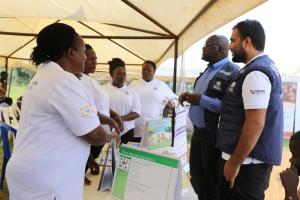Uganda rallies communities to embrace self-care for better health and well-being
Butebo. Uganda marked the 2025 International Self-Care Day with a nationwide call for communities to embrace self-care as a vital pillar of public health. Commemorated under the theme “Self-Care Interventions for Health and Wellbeing: Unleashing Young Persons’ Potential,” the event emphasized empowering young people to take charge of their health through informed decisions, proactive behaviors, and serving as ambassadors of self-care.
Held at the Butebo District headquarters, the celebration brought together government leaders, health officials, United Nations agencies, civil society organizations, and community representatives. The goal: promote self-care as a pathway to universal health coverage and improved individual well-being. This marked Uganda’s third consecutive year commemorating International Self-Care Day, with a renewed commitment to prioritizing mental, emotional, and physical health.
Dr Charles Olaro, Director General of Health Services at the Ministry of Health, likened self-care to a traffic light—green for good health, yellow for early symptoms, and red for severe conditions requiring urgent attention. Noting that men often delay seeking care, he urged Ugandans to take breaks, re-energize, and seek timely medical support.
“We urge the public to adopt health-seeking behaviors and embrace self-care as a daily practice. Working with the Ministry of Education, we are integrating self-care into the school curriculum to nurture a generation that values personal health and well-being,” said Dr Olaro.
Hajjati Safina Museene, Commissioner for Business, Technical, and Vocational Education and Training (BTVET) at the Ministry of Education and Sports, stressed the role of schools in fostering good nutrition, mental well-being, and physical activity.
“Self-care equips young people with the knowledge and skills to manage their health, make informed decisions, and contribute meaningfully to society. When empowered, they become responsible citizens and catalysts for social transformation,” she noted.
Self-Care Month in Uganda runs from 24 June to 24 July, culminating in International Self-Care Day. The 24/7 symbolism reflects the idea that self-care can—and should—be practiced 24 hours a day, 7 days a week. The month provides an opportunity to raise awareness of self-care interventions, celebrate the benefits they bring, reflect on progress achieved, and renew commitments to including self-care as an integral part of a people-centred health system.
Self-care interventions in Uganda include HIV self-testing, contraceptive use, and home-based management of chronic conditions like diabetes. These tools empower individuals—especially adolescents and vulnerable groups—to take control of their health in private, confidential, and dignified ways.
With WHO’s technical support, Uganda has adopted the WHO Self-Care Competency Framework, which outlines essential skills such as shared decision-making, respectful communication, and safe guidance. These competencies are being integrated into national training curricula for nurses, midwives, and community health extension workers. Plans are underway to engage social media influencers, collaborate with other government agencies, and embed self-care across community health programs. se efforts align with global frameworks aimed at achieving Universal Health Coverage , including the Primary Health Care approach, which emphasizes empowered people and communities as one of its core components, and the Global Strategy for Women’s, Children’s, and Adolescents’ Health.
“Self-care is about dignity, autonomy, and resilience. It does not replace the health system—it strengthens it,” said Dr Kasonde Mwinga, WHO Representative in Uganda. “Let us ensure that every Ugandan, regardless of their location, has access to the tools, knowledge, and support necessary to take charge of their health. Together, we can build a more empowered, resilient, and healthier Uganda.”
With global health challenges looming, including a projected shortage of 18 million health workers by 2030 and over 400 million people lacking access to essential services—self-care is emerging as a transformative solution. It enables individuals, families, and communities to promote health, prevent disease, and manage illness, with or without direct support from healthcare providers.
